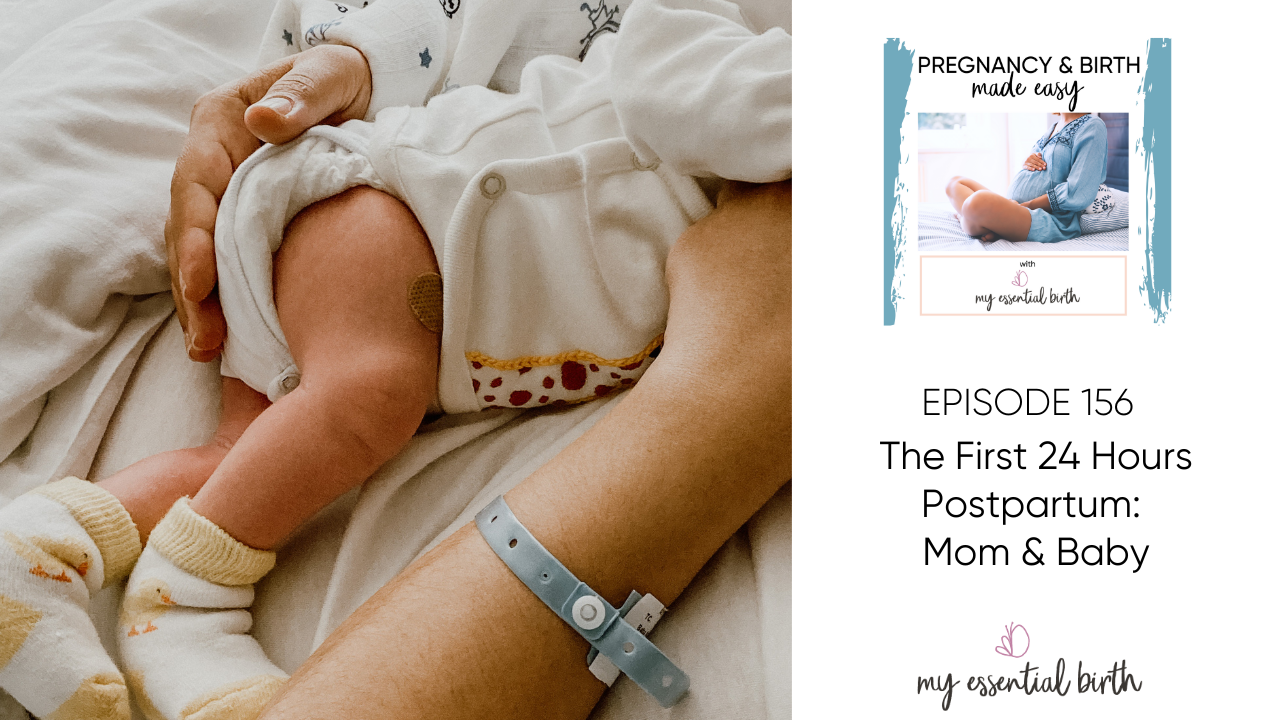The First 24 Hours Postpartum: Mom & Baby

Show Notes:
What can I expect in the first 24 hours after my baby is born? For mom, we’ll talk about all the things such as afterbirth, tearing, and what’s going on with your body. For baby, we’ll talk about tests, medical procedures, and even paperwork!
Our reviewer of the week, evitakay, said: “Love. I like to determine quality, reliability, truthfulness of podcasts and blogs, etc. by listening to or reading about something they talk about that I’ve already researched and come to a conclusion on myself. The vaccine episode is what hooked me with this podcast. Everything was laid out effectively and succinctly, and was EXACTLY in line with the research I’d found. And it was especially refreshing to hear the information given in an unbiased way. Fantastic.”
Truly, this is the goal with my podcast! I try to present all of the information so you can make an informed choice! (Our vaccine podcast is Episode 90, in case you wanted to listen to it.) 💜
[2:20] Today’s topic is going to be AWESOME! 🤩 We’re going to talk about things that are often overlooked when it comes to the first 24 hours after your baby is born. ⏰
[3:16] As you’re listening, if you think of something I may have missed or something that you experienced, let me know! Feel free to email us at [email protected] or DM us on IG @myessentialbirth. We love to hear from you! 🥰
[4:45] If nothing else, I hope today’s episode at least prepares you in a “Oooh, good to know!” kind of way! Or if you’re not a first-time mom, you’ll be nodding your head saying, “Yep! I wish someone had told me about that!” 😅
[4:55] Commercial Break. 🎬 In case you haven’t heard, we are in the middle of creating our postpartum course! We are hoping to have it ready by the end of the year or the beginning of next! We want to hear from you! We want feedback, information, your questions, and your concerns! I’m offering some opportunities for 1-on-1 interviews regarding postpartum. Stay tuned! 😎
[5:58] What happens immediately postpartum? The provider’s focus will be on the birth of the placenta, which is called active management of the 3rd stage. (I’m linking Episode 153: Pitocin for the Third Stage of Labor for you to reference regarding the reason why or why not to use Pitocin during that time.)
[7:03] What happens during the active management stage? I talk about fundal massage, blood loss, postpartum hemorrhage, and medications that may be given at that time. 🩸
[8:33] There are different approaches to help with the birth of the placenta, which I also touch on in Episode 153. 💉
[9:50] We had a great question come up in the private Facebook group (available to those who purchase the My Essential Birth course). A mom asked what effect a shot of Pitocin would have on breastfeeding/bonding. Everything we do has an effect on mom and baby! Pitocin does have an effect on breastfeeding, latching, and bonding. 👩🏼🍼
[11:15] If the placenta does not come off on its own or a piece is left behind, it can lead to infection or placenta accreta. I explain the process of how providers will remove the pieces that have been left behind. 👨🏻⚕️
[12:31] Postpartum tearing: what is it, what are the different types of tears, and what is done to repair those. Postpartum cleanup includes wipe down of the body, changing the pads, sheets, etc. 🪡
[14:00] A very normal reaction after birth is mom’s uncontrollable shaking or shivering. It is usually the result of hormones, and your body just went through birth! 🥴
[14:52] The first thing they do for your baby after birth is an APGAR test. It stands for Appearance (skin color), Pulse (heart rate), Grimace (reflexes), Activity (muscle tone), Responsiveness (breathing rate and effort). Babies with a higher APGAR score are typically given back to mom while babies with a lower score may need some help. 📈
[16:04} Other decisions that need to be made once baby is born: delayed cord-clamping, immediate skin-to-skin, immediate breastfeeding, Hep B (can be waived), erythromycin, circumcision (done a few days after), PKU testing (heel prick), and vitamin K shot (blood clotting). ✂️
[17:43] You can search for any of the subjects mentioned in this episode by clicking the link here and typing in the search box. 🔎 I highly suggest you look into those topics BEFORE you give birth as most of the decisions need to be made quickly. Do your research! 🕵🏻♀️
[18:57] Postpartum fundal massage will happen every 15 minutes for 2 hours to check on your bleeding. Try ice packs for your “down there” area. 🧊
[19:46] When you do start breastfeeding, there are after pains, which get worse and more intense after each baby. 🥴 They go away after a few days, don’t worry! I recommend After Ease, which is an herbal tincture that can help! The purpose of the after pains is to get your uterus to shrink down to its normal size.
[21:33] Peeing and pooping. 💩 You will need to have a bowel movement before you can be discharged. Use your peri bottle to help while you pee (it’s your own personal Bidet!) and DON’T wipe!!! ❌ You may be scared to poop after birth, but you will be okay! I recommend eating a lot of prunes, leafy greens, fruits, vegetables, and maybe a stool softener.
[24:12] You will be bleeding heavily for the first few days after birth. Your body has a lot of things to work out of its system! You’ll have bright, red, heavy bleeding (with possible tissue and clotting) for the first 3-4 days. 🩸
[25:03] You’ll be given this really sexy mesh underwear after birth. I also recommend Depends. 🩲
[25:31] When you move to your recovery room, you should get a nice, hot meal and hopefully a shower! 🚿 You do not need to stay in the hospital for 24-hours if mom and baby are doing well. (And if they don’t have any other conditions such as circumcision, GBS+, etc.)
[27:31] You can choose for your baby to go to the nursery or stay in the room with you. A pediatrician will check on the baby. 👩🏻⚕️ Which is why you need a pediatrician chosen BEFORE you go to the hospital. I talk about my experience with my first baby when I didn’t have a pediatrician chosen beforehand. 🙄
[29:31] Newborn testing: hearing screening, reflexes, weight, etc. They will offer to give your baby a bath, but you can decline it. There are many benefits to waiting on giving baby a bath. 🛁
[30:07] Baby’s weight. It’s totally normal for a baby’s weight to fluctuate over the first few days. Typically, it will dip and then pop back up after a few days. You’ll need to set the next appointment for your baby postpartum. Moms typically aren’t seen by their provider until six weeks later. ⚖️
[31:19] Make sure your car seat is ready to go! 🚙
[31:31] Paperwork for baby: birth certificate, Social Security card info, all the release forms, etc. They’ll give you a postpartum packet with warning signs, how to take care of yourself and baby, etc. 📃
[32:47] A word on visitors . . .👏🏼 YOU.👏🏼 GET.👏🏼 TO.👏🏼 CHOOSE. 👏🏼 You can choose when you have visitors: during labor, right after pushing, when you’re moved to recovery, when you’re home, etc. This is a very sacred time between mama and baby! Think about what you want before labor happens and have good communication with your birth partner about your wishes.
[34:48] Utilize your birth team! Nurses are excellent about protecting your barriers and space. 🤚🏼 Midwives will do the same and take the fall for you. Choose the birth space that is right for you.
[35:56] Now you’re heading home! 🏡 What to expect: you may feel a little out of it, your milk may not come in yet (usually by Day 3), you’re tired/sore, and you can feel overwhelmed.
[37:39] Just know that your hormones are going to be changing and shifting. You’ll have a hormone drop and feel anxious, overwhelmed, etc. The Edinburgh scale can help you assess whether you have the postpartum blues or postpartum depression. 😞 I recommend listening to Episode 139: Recovering from Birth Trauma with Karina Robinson.
[38:52] Talk, talk, talk! 💬 Talk about your birth, share your birth experience, and trust your mom gut! Journaling may help too! 📖
[39:48] This is so important . . . COMMUNICATE with your birth partner during pregnancy and also after birth. Have the conversations prior to your baby being born about your expectations. 👩🏼❤️👨🏻
[41:33] You’re doing great! In fact, you are doing a lot better than you think you are. You are made to be able to not only birth your baby but to be an excellent mother to your baby. 💜
To Leave a Review ⭐️
- Open Apple Podcasts
- Find “Pregnancy & Birth Made Easy” podcast
- Select “Ratings and Reviews”
- Click the stars!
- Select “Write a Review” and tell us what was the most amazing, comforting, eye-opening thing that you loved!
ALL the best,

Links Mentioned:
Episode 90: Vaccines: What You Need to Know
Episode 153: Pitocin for the Third Stage of Labor
Edinburgh Postnatal Depression Scale
Episode 139: Recovering from Birth Trauma with Karina Robinson

